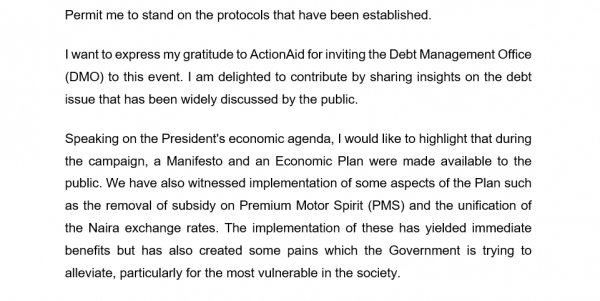Over the past few years, the economy has been the subject of intense debates with suggestions from many experts and analysts on what the government should or should not do to remedy the situation. However, it is essential to recognize that the situation of the economy needed critical and urgent attention to avoid a deterioration in major economic and social indices. Thus, some of the measures that have been taken so far were not only needed but essential to propel Nigeria towards sustainable development. In this pursuit, we must aim for a development model that leads to increased employment opportunities and higher income levels. Low growth with high unemployment levels are insufficient to achieve sustainable growth that aligns with our collective aspirations.
While the pains from the recent Government actions have led to criticism about their necessity and timing, I will delve into the impact of subsidies and exchange rates on the Budget. Perhaps, this may enable us better appreciate the long term benefits of these policy actions.
As many of you are aware, the Debt Stock has grown but it is important to understand the reasons behind this growth. Subsidies are an Expenditure item in the Budget, thus invariably, they contribute to the Budget Deficits. On the other hand, the Naira exchange rates used for the Budgets are the official rates, which we all know are much lower than the open market rates, the effect of which is lower Revenue. Overall, these two (2) policy stance that were maintained over many years, contributed to consecutive Budget Deficits which were financed by an average of 90% through borrowings. For instance, the size of the 2023 Appropriation Act (Budget), is about N21 trillion with a Deficit of N11 trillion to be financed by New Borrowing of over N9 trillion.
The reversal of these Policies by His Excellency, the President has resulted in much higher Revenues for all tiers of Government. In June and July 2023, the funds distributed by the Federal Accounts Allocation Committee (FAAC) were over N907 billion and N1.959 trillion respectively, compared to between N500 billion and N750 billion previously.
As the Debt Stock continued to grow due primarily to consecutive Budget Deficits, it unavoidably resulted in an increase in Debt Service obligations. Currently, Debt Service consumes a significant portion of our Revenues, not necessarily because Debt Stock is high but because Revenue is low and worse still, underperforms the targets in the Budgets. It is pertinent to state that Nigeria’s Debt Stock to GDP ratio at below 25% is among the lowest globally. While Debt Service to Revenue Ratio, which in 2022 reached 100%, is relatively high and reduces the fiscal space available to Government. This indicates that the issue lies with our Revenue. Unfortunately, the focus on Revenue improvement previously did not change the outcomes significantly.
The recent quick actions to bring Revenue to the fore by the present administration are steps in the right direction. My main message here is that we cannot discuss growth, development, or debt without giving due consideration to Revenue. It is now imperative that we confront Revenues and take decisive actions to further strengthen our Revenue streams from all sources. We expect to see improvements in Revenues from the work of the Committee on Revenues set up by his Excellency, President Tinubu.
Once again, I extend my sincere gratitude to ActionAid for inviting me and wish all the participants fruitful deliberations that will contribute to the discourse surrounding the economic agenda of His Excellency the President.
Thank you for your kind attention.
Patience Oniha
July 25, 2023
